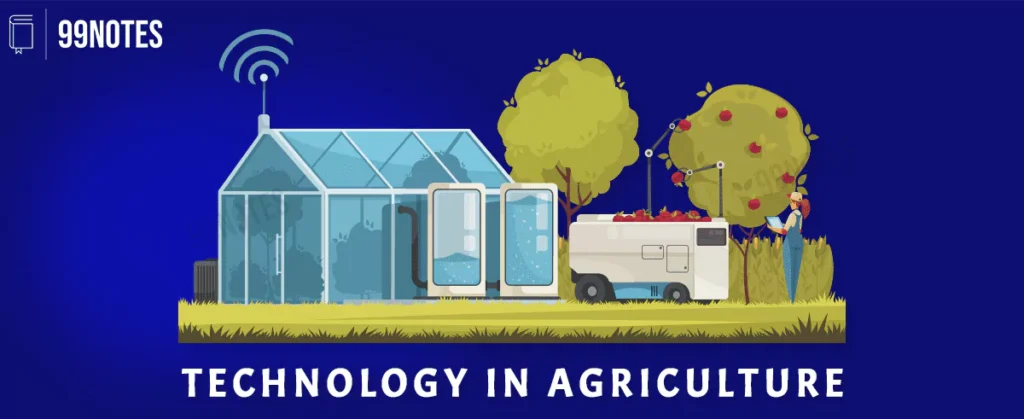
Technology in Agricultural Free UPSC Notes Download
Technology in Agriculture
The use of technology in agriculture, also known as precision agriculture or smart farming, refers to the application of advanced technologies and techniques to optimize the production and management of crops and livestock.
This includes the use of sensors, drones, robotics, and data analytics to improve efficiency, productivity, and sustainability in agriculture.
There are many ways in which technology is being used in agriculture to address a range of challenges and opportunities.
Some examples include:
- Crop monitoring and management: Technology is being used to improve crop monitoring and management through the use of sensors, drones, and satellite imagery. For example, sensors can be used to monitor soil moisture, nutrient levels, and pests, while drones can be used to collect data on crop growth and health. This information can be used to optimize irrigation, fertilization, and pest management practices, leading to more efficient and sustainable crop production.
- Livestock management: Technology is also being used to improve livestock management through the use of sensors, robotics, and data analytics. For example, sensors can be used to monitor the health and behavior of animals, while robotics can be used to automate tasks such as feeding and milking. Data analytics can be used to optimize feeding and breeding practices, leading to improved animal health and productivity.
- Supply chain management: Technology is also being used to improve supply chain management in agriculture by enabling traceability and transparency. For example, blockchain technology can be used to track the movement of agricultural products from farm to consumer, providing consumers with information about the origin and quality of the products they are purchasing. This can help to improve food safety and build consumer trust.
- Precision irrigation: Technology is being used to improve precision irrigation through the use of sensors and data analytics. By monitoring soil moisture and weather conditions in real-time, farmers can optimize irrigation schedules and reduce water waste. This can help to improve crop productivity and conserve water resources.
- Precision fertilization: Technology is also being used to improve precision fertilization through the use of sensors and data analytics. By monitoring soil nutrient levels and crop growth, farmers can optimize fertilization schedules and reduce fertilizer waste. This can help to improve crop productivity and reduce environmental impacts.
Overall, the use of technology in agriculture has the potential to improve efficiency, productivity, and sustainability in the sector. By enabling farmers to make more informed decisions and optimize their practices, technology can help to address challenges such as food security, environmental sustainability, and rural development.
However, the adoption of technology in agriculture also poses some challenges, including the need for infrastructure, training, and financing, as well as concerns about the potential negative impacts on employment and the environment.
It is important for policymakers and stakeholders to carefully consider these challenges and opportunities in order to ensure that the benefits of technology in agriculture are realized in a responsible and equitable manner.
- Technology can help to improve the efficiency and productivity of agriculture by enabling farmers to make more informed decisions and optimize their practices. For example, the use of sensors and data analytics can help farmers to identify problems and opportunities in real-time, such as pests, diseases, and nutrient deficiencies, and respond accordingly. This can lead to higher yields and more efficient resource use.
- The use of technology in agriculture can also help to improve sustainability by enabling farmers to reduce waste and minimize negative environmental impacts. For example, precision irrigation and fertilization can help to reduce water and fertilizer waste, while the use of sensors and data analytics can help farmers to optimize their practices and reduce the use of pesticides and other inputs.
The adoption of technology in agriculture can also have positive impacts on rural development and the economy. By enabling farmers to increase their productivity and competitiveness, technology can help to create jobs and increase income for rural communities. It can also contribute to the development of new products and markets, which can drive economic growth and innovation.
Some of the challenges associated with the use of technology in agriculture include the need for infrastructure, training, and financing. For example, the adoption of technology may require the development of new infrastructure, such as irrigation systems and data networks, as well as the training of farmers and other stakeholders in the use of new technologies. It may also require the provision of financial resources to enable farmers to purchase and maintain new technologies.
There are also concerns about the potential negative impacts of technology on employment and the environment. For example, the adoption of certain technologies, such as robotics, may lead to the displacement of workers and contribute to unemployment in rural areas. There are also concerns about the potential negative impacts of certain technologies, such as pesticides, on human health and the environment. It is important for policymakers and stakeholders to carefully consider these challenges and opportunities in order to ensure that the benefits of technology in agriculture are realized in a responsible and equitable manner.
Going Forward
The 21st century has been defined by the usage of technology. As the world progresses toward quantum computing, artificial intelligence, big data, and other emerging technologies,
India has a wonderful potential to capitalise on its position as an IT superpower and modernise the agricultural industry. While the green revolution increased agricultural output, the IT revolution in Indian agriculture must be the next major development.
Massive efforts are required to enhance the capabilities of Indian farmers, at least until educated young farmers replace the current undereducated small and medium farmers.
Agriculture technology has the ability to make India really “Atmanirbhar Bharat” in all aspects and less dependent on external influences.
Other Topics Related to Agriculture:

